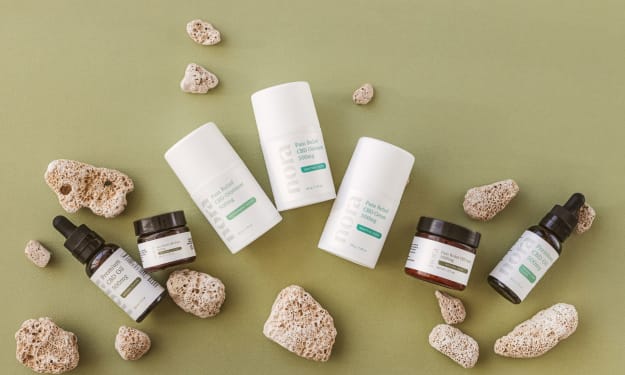Your Skin Barrier: Everything You Need to Know to Care for Your Skin
From the days of harsh scrubs to drying out spots with toothpaste in order to get rid of them, our skincare knowledge has developed massively.

It is now not uncommon to find products such as PHAs, BHAs (salicylic acid), and AHAs (glycolic and lactic acid) in everyone’s toolkit to combat spots, blackheads, and texture. Banishing blemishes, we learnt to include these exfoliating ingredients into our step-by-step skincare routines of serums and facial cleansers to perfect our skin.
But overuse could be harming our skin more than we realise.
Your skin’s moisture barrier could be damaged through the overuse of these effective, but potent, products. Popular dermatologists on TikTok love talking about our skin barrier. But it might be difficult to understand what exactly it is and how to look after it.
But BYOMA, producer of barrier-boosting skincare, is here to take you through what you need to know about your barrier and how to support it.
Knowing your skin barrier
The skin barrier keeps your skin hydrated and healthy through the outer protective layer called the moisture barrier. It’s made up of lipids, the natural fats in our skin, including ceramides, fatty acids, and cholesterol, that keep it moisturised and nasties out. These lipids bind your tough skin cells together. It’s an essential element of a clear, moisturised complexion.
A healthy skin barrier will protect the deeper layers of your skin by keeping dirt, bacteria, and pollutants at bay. As a result, your skin will look and feel soft, smooth, and bright. But a damaged barrier spells bad news for your complexion.
Is your skin barrier damaged?
By feeling your skin, you can tell if your moisture barrier has been broken. Your skin not looking as good as usual is another good indicator that something isn’t right. Damaged skin is red and sensitive to the touch. You might find that your usual skincare products start to sting or feel uncomfortable, even if you’ve invested in nourishing products.
The pandemic meant that many of us tried out acids and retinoids from the comfort of our homes – we were drawn in by the promise of clearer and younger-looking skin. But it’s safe to say we got a bit obsessed with them, which has left many of us with sensitive skin prone to breakouts. This led Future Beauty Labs founder Marc Elrick to create a brand-new skincare line based on boosting your skin’s barrier.
Marc says: “In 2020, when we were all confined to our homes, we started getting into skincare and before we knew it, we were experimenting with super-strong actives. We were effectively playing chemists without understanding that these ingredients need to be used with care, and a lot of people ended up with red, angry skin.
“I began developing BYOMA the same year after learning more about skin science and the importance of our moisture barrier. BYOMA is all about boosting your skin barrier, which is essential before you begin to address any issues like texture or acne.”
Your skin barrier is damaged – now what?
Outside irritants are no longer prevented from coming into contact with your skin if your moisture barrier is damaged. This means bacteria and dirt can penetrate your skin and cause damage, including acne and texture. This leads to rough-feeling skin that is dull and prone to blemishes.
You’ll likely suffer from transepidermal water loss as a result, as your moisture barrier is essential to maintaining hydration. This leaves your skin dehydrated, so it might overproduce oil to compensate for the lack of hydration. What’s more, the inability to keep moisture in your skin means it’s more prone to signs of ageing like fine lines, dullness, and wrinkles.
What can you do to help?
You know why it’s important to care for your skin’s barrier, but how do you actually achieve this? BYOMA founder Marc shares his top tips.
Moisturize
For a broken-down moisture barrier, and for its long-term protection, a simplified skincare routine works wonders. You can incorporate multiple steps, like toners and serums, but a deeply hydrating moisturiser is essential. For dry skin, choose a moisturiser with a rich texture. Oily skin will benefit most from a gel moisturiser that hydrates without overwhelming the skin. Build your routine around this – you can add in serums that target specific concerns like blackheads, or hydration-boosting serums that add even more moisture to thirsty skin.
Keep cool and protected
While it can be tempting to wash our faces with hot water because it feels good at the time, make sure you stick to lukewarm water. Hot water can further dry out our skin and leave it feeling tight and uncomfortable.
The sun does its own damage to your skin. You need to wear SPF, even in winter. The sun’s rays are the biggest cause of skin ageing and damage. And this damage applies to your moisture barrier too.
Avoid aggressive products
Our teenage years were a frenzy of harsh chemicals and rough scrubs, aggravating our skin daily. But we’ve learnt from our mistakes – for the most part. Cleansers that are too harsh will strip moisture from your skin, damaging the barrier. Modern facial cleansers are powerful enough to cleanse your skin deeply but are also creamy and hydrating to keep your moisture barrier intact.
Stop using acids daily
Exfoliating acids and retinol can do more harm than good to our skin if overused. Skin experts such as BYOMA were created from this worry. Ingredients like salicylic and lactic acid are fantastic as part of a proper skincare routine, but their use should be limited. Don’t use these types of acid daily – instead, use them every other day at most. PHAs are a gentler option if these acids irritate your skin. If your barrier is already disrupted, stop using them immediately until your skin has calmed down.
It is easy to go overboard in the search for perfectly flawless skin, leading to a breakdown of our skin’s natural barrier. If this is damaged, we can expect red, sensitive skin that is dry, acne-prone, and rough. By prioritising your moisture barrier in your skincare routine, you’ll have clear, plump, glowing skin – and that’s the vibe we’re going for.
Sources
https://www.tiktok.com/@dermarkologist/video/7027079259697122606?is_copy_url=1&is_from_webapp=v1&q=skin%20barrier&t=1649248668636
https://www.healthline.com/health/skin-barrier#what-is-it
https://byoma.com/uk/byology-class/
https://www.instyle.com/beauty/skin/i-damaged-my-skin-barrier
https://www.skincancer.org/blog/photoaging-what-you-need-to-know/





Comments
Rachel Gray is not accepting comments at the moment
Want to show your support? Send them a one-off tip.